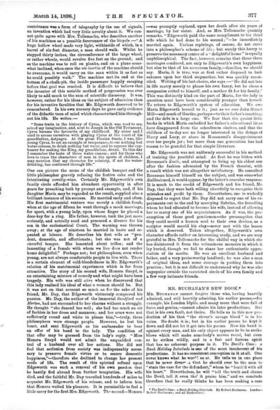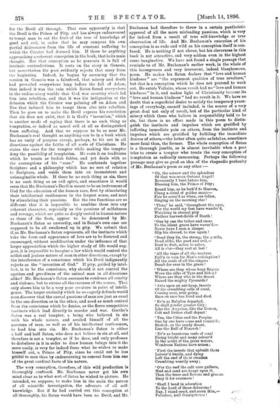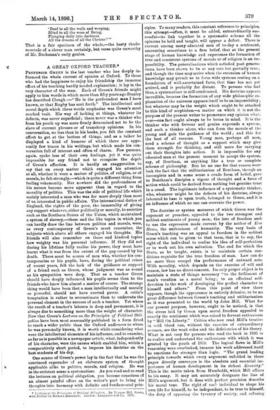MR. BUCFIANAN'S NEW BOOK.*
Ma. BUCHANAN cannot forgive those who, Laving heartily admired, and still heartily admiring, his earlier poems,—for example, his London Idylls, and many more that were full of force and genius,—cannot admire his later productions. But that is his own fault, not theirs. He tells us in this new pro- duction of his that "the riever's savage blood" is in his veins. No doubt it is ; but in his earlier poems he kept it down and did not let it get into his poems. Now his hand is against every man, and his only object appears to be to strike blows which will make somebody's nerves recoil, but even so he strikes wildly, and in a fast and furious spirit that has no coherent purpose in it. The Devil's Case : a Bank Holiday Interlude is one of the most incoherent of his productions. It has no consistent conception in it at all. One never knows what he wool--!. oe at. He tells us in one place that he never dream .o. that he should ever be the man to "state the case for the defendant," whom he " loath'd with all his heart." Nevertheless, he will "tell the truth and shame the Devil, tell it even tho' it praise him," and we conclude therefore that he really thinks he has been making a case • The Devil's Case: a Bank Holiday Interlude. By Robert Buchanan. London Robert Buchanan ; and all Bookseller-1i'.
for the Devil all through. That case apparently is that the Devil is the Prince of Pity, and has always endeavoured to tempt man to eat the fruit of the tree of knowledge of good and evil, in order that he may compass his own partial deliverance from the life of constant suffering to which the Creator had doomed him. If there be anything approaching a coherent conception in the book, that is its main thought. But that conception as he presents it is full of intrinsic contradictions. It rests on the story in Genesis, but nevertheless the poet evidently. rejects that story from the beginning. Indeed, he begins by assuming that the version in Genesis was a falsehood, that misery and death had prevailed everywhere long before the fall of Adam, that indeed it was the ruin which Satan found everywhere in the rudimentary worlds that God was creating which led him into rebellion, and that it was his indignation at the delusion which the Creator was palming off on Adam and Eve that induced him to tempt them also into rebellion. Then he goes on to make the Devil express his conviction that sin does not exist, that it is God's "invention," which is another mode of saying that there is no such thing as temptation, or indeed as moral evil at all as distinguished from suffering. And that we suppose to be as near Mr. Buchanan's real thought as anything can be in a book which has no unity of purpose except, perhaps, to hit out in all directions against the faiths of all sorts of Christiana. He states the case for the tempter while making the tempter deny the possibility of temptation. He rests it on traditions which he treats as foolish fables, and yet deals with as the assumptions of his "case." He confounds together Scripture and a philosophy which has no sort of relation to Scripture, and welds them into an inconsistent and unimaginable whole. If there be no such thing as sin, there is no such thing as an evil spirit, and sometimes it would seem that Mr. Buchanan's Devil is meant to be an instrument of God for the education of the human race, first by stimulating their intellectual restlessness in the largest sense, and next by stimulating their passions. But the two functions are so different that it is impossible to combine them into any coherent character, especially as the passions of selfishness and revenge, which are quite as deeply rooted in human nature as those of the flesh, appear to be denounced by Mr. Buchanan's Satan as unworthy, and in Satan's own case are supposed to be all swallowed up in pity. We submit that if, as Mr. Buchanan's Satan represents, all the instincts which take the form and appearance of love are to be fostered and encouraged, without modification under the influence of that larger appreciation which the higher study of life would sug- gest, it is impossible to imagine a law which would control the selfish and jealous nature of man in other directions, except by the interference of a conscience which his Devil indignantly rejects as the "invention of God." If pity, guided by intel- lect, is to be the conscience, why should it not control the egotism and greediness of the animal man in all directions alike? Mr. Buchanan's Satan assumes to condemn all cruelty and violence, but to excuse all the excesses of the senses. That only shows him to be a very poor creature in point of intelli- gence. The larger curiosity which he so eagerly defends would Boon discover that the carnal passions of man are just as cruel in the one direction as in the other, and need as much control from the conscience which he denies, as the fierce competitive iustincts which lead directly to murder and war. Goethe's Satan was a real tempter, a being who believed in sin with his whole nature, and availed himself of all the passions of man, as well as of his intellectual restlessness, to lead him into sin. Mr. Buchanan's Satan is either a half and half Satan, who does not believe in sin at all, and therefore is not a tempter, or if he does, and only professes to disbelieve in it in order to draw human beings into it the more easily, is very far indeed from what he wishes to make himself out, a Prince of Pity, since he could not be less pitiful to man than by endeavouring to conceal from him one of the great cardinal facts of his nature.
The very conception, therefore, of this wild production is thoroughly confused. Mr. Buchanan never got his own mind clear as to what sort of Satan he wished to picture. He intended, we suppose, to make him in the main the patron of all scientific investigation, the advocate of all self- knowledge. But if he had carried out this conception at all thoroughly, his Satan would have been no Devil, and Mr. Buchanan had therefore to throw in a certain pantheistic approval of all the more misleading passions, which is very far indeed from a result of true self-knowledge or true observation of life. And Mr. Buchanan's execution of his conception is as rude and wild as his conception itself is con- fused. He is nothing if not clever, but his cleverness in this book is not attractive, and very seldom even in the highest sense imaginative. We have not found a single passage that reminds us of Mr. Buchanan's earlier work, in the whole of this incongruous and very irreverent, indeed blasphemous, poem. He makes his Satan declare that "love and human kindness" are "the supremest qualities of true revolters," but that is a conception which he does not pretend to work out. He extols Voltaire, whose revolt had no " love and human kindness" in it, and makes light of Christianity because its "love and human kindness" had no revolt in it. We have no doubt that a superficial desire to satisfy the temporary yearn- ings of everybody, oneself included, is the source of a very great deal not only of revolt, but of the particular kind of misery which those who believe in responsibility hold to be sin, but there is no effort made in this poem to distin- guish the instincts and impulses which are gratified by inflicting immediate pain on others, from the instincts and impulses which are gratified by fulfilling the immediate desires of others,—the latter often quite as fatal as, sometimes more fatal than, the former. The whole conception of Satan is a thorough jumble, as is almost inevitable when a poet tries to create a tempter who treats the very conception of temptation as radically unmeaning. Perhaps the following passage may give as good an idea of the rhapsodic profanity of Mr. Buchanan's poem as any other :—
"Oh, the sorrow and the splendour Of that woe-worn Outcast Angel! Reverently I bent before him, Blessing him, the Prince of Pity; Round him, as he look'd to Heaven, Clung a cloud of golden music— Fair he seem'd as when, ere fallen, Singing on the morning star !
' Thus,' he said, throughout the ages, O'er the world my feet have wandeed, Watching in eternal pity Endless harvest-fields of Death !
'One by one the tribes and races To the silent grave have waver'd,— Never have I seen a sleeper Slip his shroud, to rise again !
'Dead they lie, the strong, the gentle, Dead alike, the good and evil,— Dust to dust, ashes to ashes, All is o'er—they rest at last !
All the tears of all the martyrs Fall'n in vain for Man's redemption ! All the souls of all the singers Dumb for ever in the grave !
Where are they whose busy fingers Wove the silks of Tyre and Sidon ? Where are they who in the desert Raised the mighty Pyramids ?
' Ants upon an ant-heap, insects Of the crumbling cells of coral, Coming ever, ever going, Race on race has lived and died.
Ev'n as Babylon departed, So shall yonder greater City; Like the Assyrian, like the Roman, Celt and Briton shall depart !
Yea, the Cities and the Peoples One by one have come and vanish'd : Broken, on the sandy desert, Lies the Bull of Nineveh !
Ev'n as beauteous reefs of coral Rising bright and many colour'd In the midst of the great waters, 'Wondrous Nations have arisen;
First the insects that upbnilt them
Labour'd busily, and dying Left the reef of their creation Crumbling wearily away; O'er the reef the salt ooze gathers, Mud and sand are heapt upon it, Then the trees and flowers and grasses Bury it for evermore !
'Shall I bend in adoration To the Lord of these delusions ? Nay, I stand erect, and scorn Him,— Pnlseless, null Omnipotence !
'Deaf to all the wails and weeping, Blind to all the woes of Being, Plunging daily into darkness All the dreams of all the Christs That is a fair specimen of the whole,—the hasty rhodo- montade of a clever man certainly, but verse quite unworthy of Mr. Buchanan's early genius.








































 Previous page
Previous page